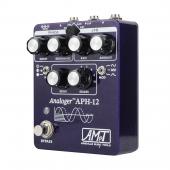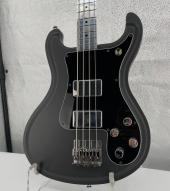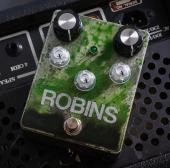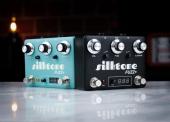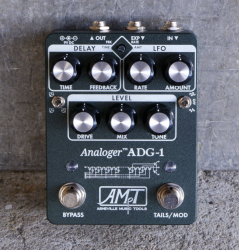Asheville Music Tools ADG-1 Delay
Brands:
The ADG-1 is the latest installment in Hawker’s legacy of highly sought-after analog delay designs. Utilizing a pair of Xvive ™ high voltage BBDs, this delay features up to 700ms of harmonically rich, perfectly floating echoes with an extensive and fully analog control set unprecedented for a pedal of its size. From a bright country slapback to washy dotted eight leads to psychedelic modulated odysseys, the ADG-1 is the new standard in compact analog delays.
Technical Details
The ADG-1 includes over 400 carefully selected components. The entire signal chain utilizes premium audio-grade op amps and high-tolerance, non-microphonic capacitors to guarantee high performance, temperature stability, and low noise.
We began with a classic delay architecture using a pair of studio grade Xvive™ MN3005 reissue Bucket Brigade Devices (BBDs) and a high voltage step-up power supply for maximum headroom. We implemented a tightly calibrated vintage-style compander and incredibly deep, discrete transistor, 5th-order anti-aliasing and reconstruction filters to provide a familiar character with superior clarity, noise reduction and dynamic feel. Our feedback circuit uses a voltage-controlled transconductance amplifier, which provides Hawker’s classic feedback tone while offering the most accurate method for dialing in infinite repeats without runaway or for achieving total feedback overload.
The input preamplifier is critical to the sound of any analog effect. A discrete, high impedance, JFET input stage provides consistent operation across all sound sources and can be used as an always-on buffer. The preamplifier and drive circuit can be used to overdrive the delay line and mixer section for unique artifacts and character that only an analog delay can provide.
We spared no opportunity for flexible control while maintaining a completely analog circuit. The clock generation, modulation oscillator, and even the switching logic are all fully analog in nature. Our clock VCO, with temperature compensated exponentiator, drives the BBDs at extremely high current to eliminate artifacts and provide for a clearer sound. An assignable Expression/CV input expands the flexibility to the limits of user creativity: use an expression pedal to warp the delay time, swell in self-oscillating feedback, or add a modulated vibrato flourish in real time.
An effect of this complexity depends entirely on its power supply and input protection. We took every measure possible to eliminate sources of noise and radio frequency interference (RFI/EMI), as well as protect from electrostatic discharge (ESD) spikes to ensure carefree operation in any studio or performance environment. Our step-up high voltage power supply operates in the MHz range, well beyond the audio band and most other pedals. All voltage sources are highly filtered to eliminate noise and crosstalk between the BBD clock, LFO, and other sections with a multi layer PCB utilizing dedicated split power and ground planes. The power input is fully protected from reverse polarity and over-voltage conditions.
Detailed Control Overview
Time: Delay TIME, adjustable from 35ms to 700ms with the Bucket switch down (all BBDs), or 17ms - 350ms with the Bucket switch up (half the BBDs). Expanded to 900ms to 27ms (45s-13ms) with Expression pedal, control voltages or LFO.
Feedback: Amount of repeats. Tapered perfectly to achieve infinite repeats without runaway, for evolving ambient washes and plate-like reverb tones, or push it into self oscillation for a whole new realm of sonic exploration.
Rate: LFO rate, from 0.08Hz to 40Hz (or faster with use of an Expression Pedal). Modulate your playing for even more sonic possibilities. From shimmery glitters to mind numbing dive bombs, octave shifting and more the LFO will take your delay to new sounds with true fractional delay modulation that can only be achieved by true analog delays.
Amount: LFO amount. Control the influence of the LFO on the delay, from completely off to mind-bending warbles! Unlike traditional delays that use a linear modulation, we use an exponential modulator for smooth volt/octave time and frequency shifts that stay musical over the entire sweep range.
Drive: up to +22dB or -3dB at the input. The onboard preamp is capable of complete transparency, a light boost for level matching, or musical saturation and compression.
Mix: the blend between Wet (effected) and Dry (un-effected) signals. Capable of fully muting the dry signal, ideal for parallel effects loops.
Tone: Placed inside the feedback loop, turn the controls counterclockwise for the muted warmth of classic analog delays, turn clockwise for a bright, magnetic-style echo tone that can either fold under your playing or become more pronounced with each repeat.
Bucket Toggle: sets the time range. Use 2 buckets for longer delays, and use 1 bucket for slapback and faux chorus/flange sounds.
LFO toggle: sets the LFO waveform between triangle, slewed square or off (center). Triangle waves are perfect for classic modulated sounds, and square wave can produce musical pitch jumps or atonal chaos.
Bypass Footswitch: effect on/off - internal switch selects between True Bypass and Buffered Bypass using a JFET buffer for a warm yet natural buffered sound.
Tails/Mod Footswitch: depending on the mode (set internally), can be used to either engage the modulator or to mute the input for trails bypass (sometimes called Spillover).
Expression Switch: 4 position rotary switch lets you control the Time, Feedback, Rate or Amount with an external expression pedal (internal +5V supplied on ring) or a 0-5V CV input for even more range and control of your playing.
Internal switches:
True Bypass / Buffered bypass: Select between true bypass (takes the ADG-1 entirely out of your signal path) or a classic JFET buffered bypass to give drive and keep your signal chain from undesirable tone suck, noise and signal loss.
2nd Stomp Switch function: Select the function of the 2nd stomp switch. Either used to kill/stop the modulation effect when pressed or trails mode where pressing the signal will allow the signal in the BBD chain to continue to feedback and play without new input while you play on top and let the existing sound naturally trail off.
*cosmetic differences between pedal runs do occur. Knobs, colorway may be slightly different between runs.

